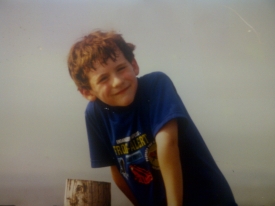
There was the time Renee and I stopped to have lunch at a restaurant in a Mexican village. While we were eating I noticed a woman staring at us. I figured she just appreciated seeing other Americans in the place, but she didn’t look away. A few minutes later she came to our table, laughing excitedly. She was Renee’s babysitter back in their small western New York town.
These things happen. Right place, right time.
Then there was the time two friends from high school came to one of my readings. I’d not seen them in thirty-five years, yet they stood there as if neither aged all that much. Later when we sat talking I asked if they lived on mountaintops. They both said no so I said then it doesn’t make sense, them not aging all that much.
(Physics sidebar: time goes slower the higher you are. Time is measured at sea level, so someone on top of K-2 would take longer to get all the way around. Think of a track around a football field. The person on the very outside lane [the mountain top] will take much longer and travel farther than the one on the inside lane, which is the one used for measuring. These two women from high school looked like they had been high).
Someone once told me that everyone we meet in life we pass again at least once more. At first this frightened me because the first and only time I ever saw Lee Pierce was in seventh grade when he beat the crap out of me at a bus stop because his girlfriend liked me; I don’t need that drama back in my life. But the more I thought about it, the more I wondered how true it might be. For those who don’t travel much, running into everyone twice over the course of seventy or eighty years might not be too difficult. And for those who travel often, the constant shuffling through airports and pubs increases the likelihood of multiple run-ins. I’ve been through Kennedy airport quite often. Surely at least once or twice someone I grew up with was there at the same time.
Like the time I was walking down a street in St Petersburg, Russia, when a woman I had worked with ten years earlier in Pennsylvania was standing in a restaurant banging on the window to get my attention.
We have long lists of people we’d love to see again. It’s why I like to people-watch while waiting in malls or airports or train stations. Even more fun is spotting the Doppelgangers out there, both famous and familiar. Years ago I spent time at Chapel Hill with the visual twins of Pete Rose and Penny Marshall. Then there was the time just a few years ago in Spain when a friend from college who knew I was going to be on the Camino wrote to ask if we’d light a candle for him for a health issue. Of course, so the morning of his appointment in Ohio, July 25th, we headed out for the next twenty miles of our stroll near Pamplona when John from New York joined us for the. John was the spitting image of my friend from college. His voice, his eyes, the way he laughed, his gait—all of him—was the mirror image of the one person who asked us to light a candle for him on that very day for his appointment five thousand miles away. Good timing I suppose.
I was in a food store in the late eighties when a kid ran past and knocked over a display. A very old man bent to pick up the packages and I helped. While we were crouched down I noticed his Knights of Columbus lapel pin. I said I knew of the organization and when he talked I knew he was from Brooklyn. I said my grandfather had been heavily involved in the Knights in Brooklyn but it would have been before his time, I’m sure. It wasn’t. When I told him my grandfather’s name, he responded with his ancient smile, “Ed! Ed Kunzinger! I knew him when I first joined! He was already State Deputy then!” That man was the only person I’ve ever met outside of family who knew my grandfather. That was kind of cool and, again, good timing. Thank God the kid knocked over the cookies.
Everything is timing, isn’t it?
A man in Buffalo was sitting in his recliner watching television when a jet trying to land at the airport crashed into his home and killed him. The news said he was in the wrong place at the wrong time. No he wasn’t. He was in the right place at the wrong time. The plane was in the wrong place. We do that a lot, excuse things, find cause and blame.
There are four possibilities: Right place right time, right place wrong time, wrong place right time, wrong place wrong time.
- You’re going to work and while waiting to turn at the stop light you look down and outside the car is a bag of cash: Right place right time.
- You’re going to work and while waiting at the light a plane crashes into your car. Right place wrong time.
- You’re going to work and get lost. When you stop for directions someone gives you a bag of cash for no reason. Wrong place right time.
- You’re going to work and get lost. When you stop for directions a plane crashes into where you are standing. Wrong place wrong time.
Could be luck. Could be fate. Could be distractions or even hyper-attentiveness.
The other day I stopped to buy something at a mall in Virginia Beach. It is the same mall that my father liked to walk around during his later years. It is quiet there, less crowded than others, and the floor is carpeted. Comfortable chairs and benches are nicely spaced, and since it is on my way from one college to another, I would often swing through the parking lot to look for his car. He always parked in the same area, and if it was there I would go in and find him and walk with him a while.
On Tuesday last week I walked through to get to a particular store when I spotted someone walking slowly. It made me sad, of course, remembering my walks with Dad, but the familiarity of it made me look at him as I walked by, and I knew I knew him, or knew him at some point. So I followed him to talk to him when he sat down. I’m sure security were all gathered around a monitor somewhere to figure out what this stalker was doing. I was stealth, looking in windows and stopping to tie my shoe several times. He went to a lottery machine and looked at cards, so I went to the next machine and looked at other cards. I had no idea that some of these things cost twenty bucks and the odds of winning at least twenty dollars back are pretty bad! There was one ticket that was twenty dollars and you only got to scratch one spot to win. And people buy these things!
Anyway.
He looked at his machine and I looked at mine and finally I said, “Twenty dollars. That’s crazy.”
“Yes it is.”
“Do you play at all?”
“No. Sometimes I buy the dollar ones for my grandkids, but I don’t waste money like that. I worked too hard.”
“You sound like you’re from up north”
“I am. From Brooklyn. But I’ve lived in Colorado most of my life,” he said. It figures, I thought, the mountains; he might actually be a hundred and fifteen.
“Me too! Well, Long Island, but I was born in Brooklyn.”
I introduced myself. So did he. Nothing.
“You look familiar to me.”
“Yes, you do too. Well perhaps our paths have crossed before,” he said, “back in the old country.” We both laughed. I said it was nice to meet him and he said the same and that perhaps we’d see each other again, and I sat on a bench thinking about my dad, hoping he would come around a corner and smile.
I like to think I’ll see him again, the old man, perhaps staring at a lottery machine for no other reason than to take a break while walking. And we’ll talk about what has been going on since the last time, and eventually we’ll walk to the food court and have coffee and talk about the old days, back when we always seemed to find ourselves in the right place at the right time.









